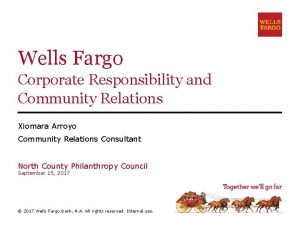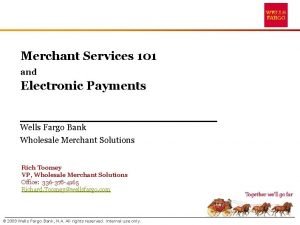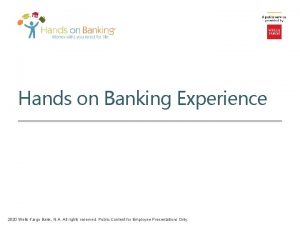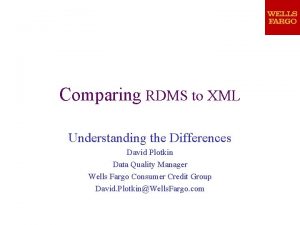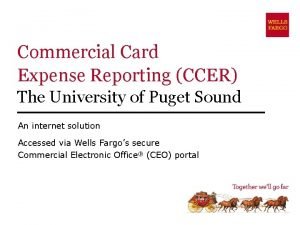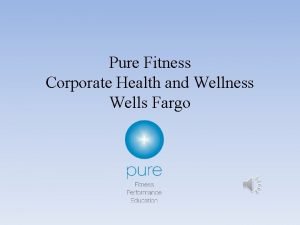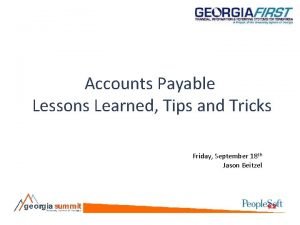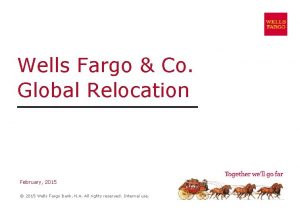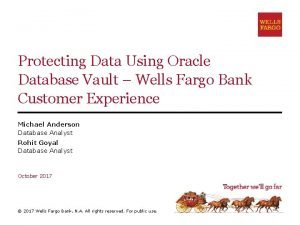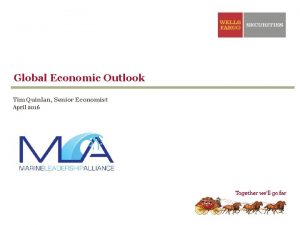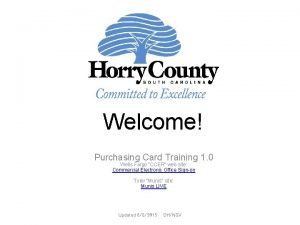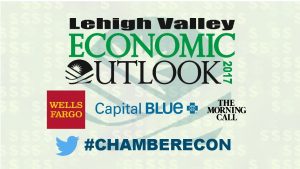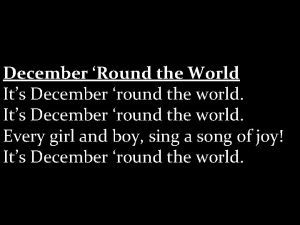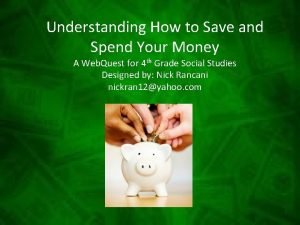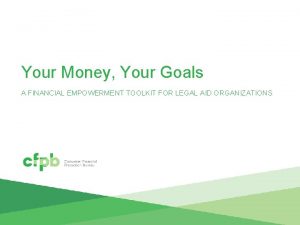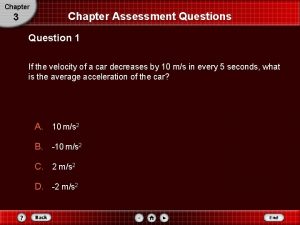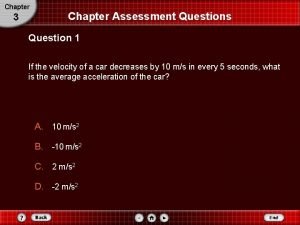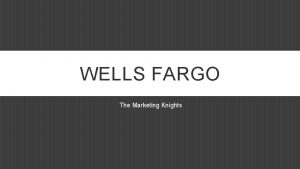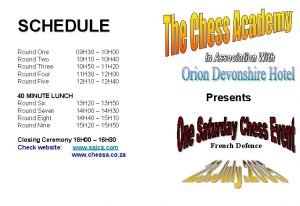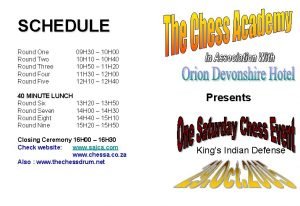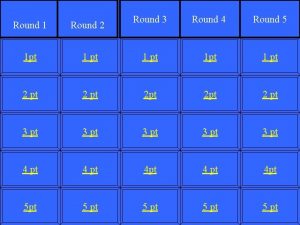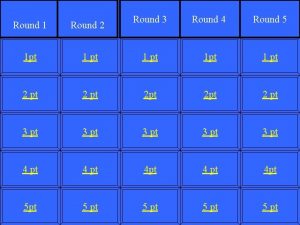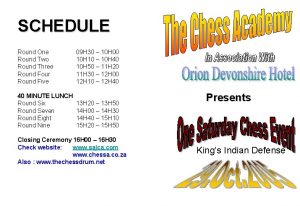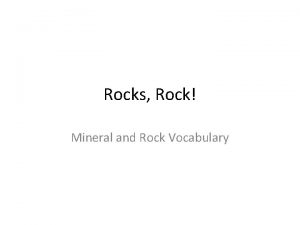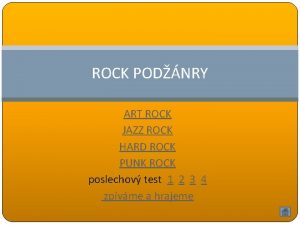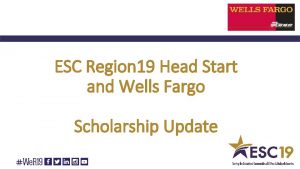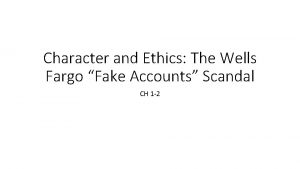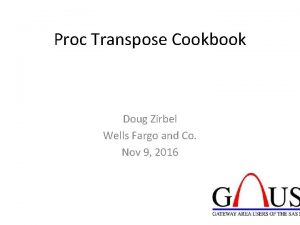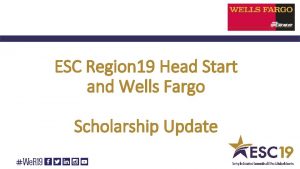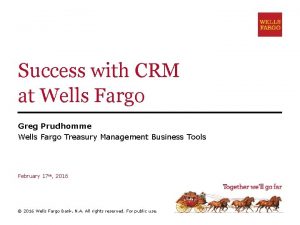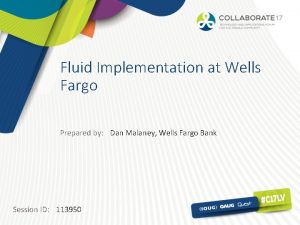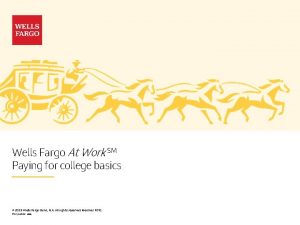You and Your Money Wells Fargo Round Rock























- Slides: 23

You and Your Money Wells Fargo Round Rock High School April 20 -21, 2016 © 2016 Wells Fargo Bank, N. A. All rights reserved.

Budget Basics 1

Discussion • What are the benefits of a having a written plan for your money? • What does it mean to make tradeoffs? 2 2

What is the purpose of a spending plan? Spending plans help you to: • Reach your goals • Stay focused • Show where you need additional help 3

Creating a spending plan Spending plans help you to: 1 Track your spending 2 Itemize your income and expenses 3 Total and compare the income and expense columns to create your spending plan 4

Money saving tips 1. Obtain buy-in from family 8. Save coupon money 2. Focus on the number of dollars you need to save per day 9. Collect loose change 10. Review cell phone costs 3. Look at lower-cost alternatives 11. Save lunch money 4. Shop around for the best interest rate 12. Save money from sales 5. Pay yourself first 13. Have a “Buy Nothing” week 6. Take advantage of your company’s payroll deductions, if possible 7. Save bonus income 5

Ten leading causes of overspending 1. The “latest and greatest” syndrome 2. Using credit instead of cash 3. Eating out 4. Borrowing from the future 5. Keeping up with the Joneses 6. Impulse buying 7. Money “burning a hole in your pocket” 8. Not knowing how much you have to spend 9. Rationalizing spending = “I need it because. . . ” 10. Not knowing what you are spending your money on 6

Basics – right starting point • Manage your accounts • Checking, saving, credit card and debit card • Keep track of all your “spending” • If you don’t have it – don’t spend it!! • Use account options to save you $$ and time • Mobile and online banking • Account alerts • Direct deposit 7

Credit and You 8

Discussion How is a debit card different from a credit card? 9 9

Credit Card Basics You are borrowing money that you have to pay back • A few things to consider ü Annual Percentage Rate (APR) ü Credit limits ü Fees & Penalties ü Payment Cycle ü Rate Increases 10

The costs of minimum payment You have got to have this $1, 500 computer! Card balance $1, 500 APR 14. 7% Lowest payment: $40 51 months & $521 interest = $2, 021 Double lowest payment: 22 months & $215 interest >$1, 715 Illustration only $80

The cost of credit card cash advance Card limit $1, 500 Cash advance $1, 000 APR 24% Fee 5% of amount borrowed Minimum payment $35 It would take 47 months to pay off, paying a total of $1620 including $570 in interest Illustration only

Student Loans 13

Discussion What do you think is the average amount of student loan debt? 14 14

Paying for college • Be sensible about where you get money for college • First, use money you won’t have to repay like scholarships and grants • Next, consider money you earn through a work-study program at your school • Then, use student loans • Federal student loans – apply for these by completing a Free Application for Federal Student Aid (FAFSA) • Private student loans – available from private lenders to cover additional costs • If you need to borrow • Borrow only what you need • Keep track of your loans and estimate your eventual monthly payments • Be realistic about what your starting salary might be

You can start to manage now • While you are in school • Know your student loan total – build it into your spending plan (future expense) • Consider making interest payments while in school if you’re able to • After graduation • Stay connected with your lender • Discuss payment options • Your effort is key

Test Your Financial Knowledge 17

Question 1 Gas and Groceries are examples of which type of expense? A) Discretionary B) Hidden C) Flexible D) Fixed § 18

Question 2 What does Net Income mean? A) Money earned on the internet B) Take-home pay C) Income before taxes D) Income earned from salary 19 19

Question 3 Annual Percentage Rate refers to the interest on charges made on your debit card True or False § 20

Question 4 Which of these are ways to pay for college that students do not need to pay back? A) Grants B) Loans C) Scholarships D) Both A and C § 21

Thank you 22
 Wells fargo community relations
Wells fargo community relations Wells fargo pos system
Wells fargo pos system Wells fargo budget worksheet
Wells fargo budget worksheet Wells fargo hierarchy
Wells fargo hierarchy Wells fargo identity theft repair kit
Wells fargo identity theft repair kit Wells fargo commercial card expense reporting
Wells fargo commercial card expense reporting Wells fargo corporate wellness
Wells fargo corporate wellness Wells fargo positive pay file format
Wells fargo positive pay file format Wells fargo relocation
Wells fargo relocation Wells fargo share price today
Wells fargo share price today Golden gate wells fargo card
Golden gate wells fargo card Tim quinlan wells fargo
Tim quinlan wells fargo Wellsfargo.com/cardholders bobs furniture
Wellsfargo.com/cardholders bobs furniture Wells fargo ohio
Wells fargo ohio Jay bryson
Jay bryson Money money money team
Money money money team Igneous and metamorphic
Igneous and metamorphic Pickle in the tannenbaum
Pickle in the tannenbaum So save your breath and the money you spent
So save your breath and the money you spent Put your left foot in
Put your left foot in Your money your goals toolkit
Your money your goals toolkit Chapter 3 standardized test practice answers
Chapter 3 standardized test practice answers Chapter 3 standardized test practice answers
Chapter 3 standardized test practice answers Do you love rain
Do you love rain
